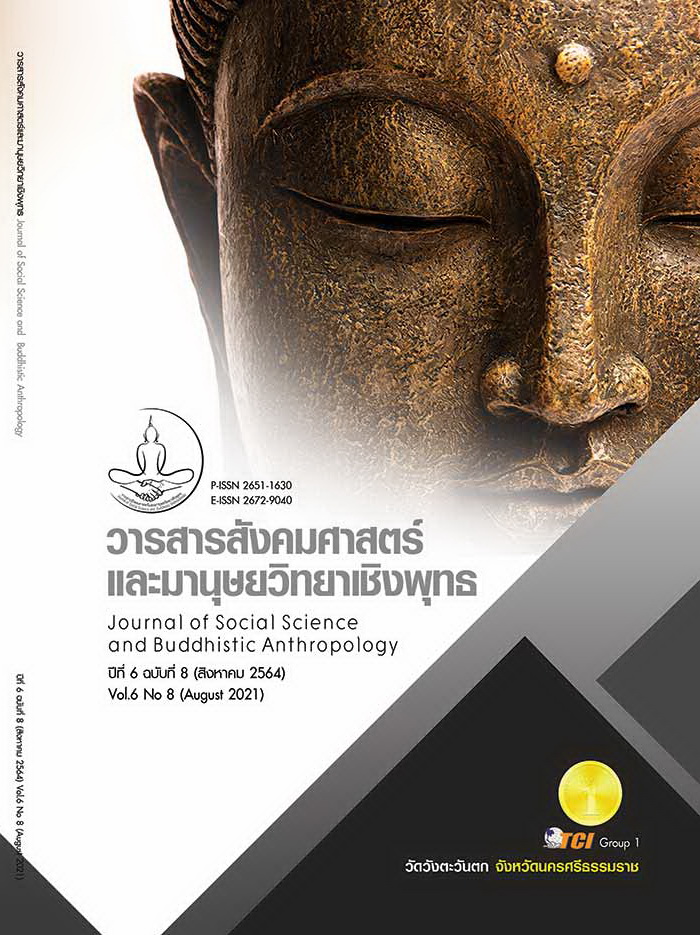A CAUSAL RELATIONSHIP FACTORS INFLUENCING TO SELF - MANAGEMENT IN PREVENTING COMPLICATION OF TYPE 2 DIABETES ELDERLY IN THE HEALTH REGION 4 MINISTRY OF PUBLIC HEALTH
Keywords:
Self - Management, Self - Efficacy, Lifestyle Behaviors, Health Literacy, Diabetes Elderly PatientsAbstract
The objectives of this research article were 1) to study self-efficacy levels, lifestyle behaviors, health literacy, and self-management in the prevention of complications of type 2 diabetes elderly 2) to examine the congruence of the causal factor model influencing self - management in the prevention of complications of type 2 diabetes elderly 3) to investigate the influence of self-efficacy, lifestyle behaviors, and health literacy towards self-management in the prevention of complications. The multi-stage random sampling technique was used to recruit 672 elderly patients with type 2 diabetes. The research instrument was questionnaires covering 5 parts, the Index of consistency (IOC) of 0.90, and the quality of the instruments of parts 2 - 5 having a fidelity value of 0.92, 0.91, 0.97, and 0.96, respectively. Data were analyzed using mean, percentage, standard deviation, Pearson’s Product Moment Correlation Coefficient, and the Structural Equation Model (SEM). The results showed that self - management, self-efficacy, lifestyle behaviors, and health literacy were indicated at a moderate level with a mean 3.74, 3.79, 3.33 and 3.86, respectively. The overall was at a moderate level with a mean of 3.70. The causal factors were consistent and had direct influence on self - management through self-efficacy, and lifestyle behaviors had direct influence on self - management with the influence of 0.39 and 0.57. Health literacy affected through lifestyle behavior indirectly on self-management with the influence of 0.49 and with the total influence of 0.39, 0.49 and 0.57 at a statistical significant level of 0.01. The variance was explained at .88 % (R2 = .88%). Therefore, the public health service agencies should focus on promoting and providing appropriate knowledge on health literacy and lifestyle behaviors.
References
กมลพร สิริคุตจตุพร และคณะ. (2560). ปัจจัยทำนายพฤติกรรมการจัดการตนเองของผู้สูงอายุโรคเบาหวานชนิดที่ 2. วารสารสภาการพยาบาล, 32(1), 81-93.
กรมควบคุมโรค. (2561). ประเด็นสารรณรงค์วันเบาหวานโลกปี 2561. เรียกใช้เมื่อ 10 กรกฎาคม 2561 จาก http://www.thaincd.com/document/docs_upload/World Diabetesday61.pdf
กรมสนับสนุนบริการสุขภาพ. (2559). การเสริมสร้างและประเมินความรอบรู้ด้านสุขภาพและพฤติกรรมสุขภาพ. (พิมพ์ครั้งที่ 1). กรุงเทพมหานคร: บริษัทนิวธรรมดาการพิมพ์(ประเทศไทย) จำกัด.
กิตติพศ วงศ์นิศานาถกุล. (2561). ความฉลาดสุขภาพของผู้ป่วยโรคเบาหวานที่เข้ารับบริการ ณ ศูนย์เวชปฏิบัติ โรงพยาบาลพระนครศรีอยุธยา. วารสารสมาคมเวชศาสตร์ป้องกันแห่งประเทศไทย, 8(1), 49-61.
มยุรี หอมสนิท. (2554). โรคเบาหวานในผู้สูงอายุและการป้องกัน. ใน ประเสริฐ อัสสันตชัย (บรรณาธิการ). ปัญหาสุขภาพที่พบบ่อยในผู้สูงอายุและการป้องกัน. (พิมพ์ครั้งที่ 2) (หน้า 195 - 220). กรุงเทพมหานคร: บริษัทยูเนี่ยน ครีเอชั่น จำกัด.
ลัดดา สะลีมา และอรสา พันธ์ภักดี. (2559). อิทธิพลของปัจจัยพื้นฐานและความสามารถในการดูแลตนเองในคนไทยที่เป็นความดันโลหิตสูง. Pacific Rim International Journal of Nursing Research, 20(1), 5-17.
สำนักงานหลักประกันสุขภาพแห่งชาติ. (2559). แนวทางเวชปฏิบัติสำหรับโรคเบาหวาน พ.ศ. 2559. กรุงเทพมหานคร: บริษัทธนาเพลส จำกัด.
Bishwajit, G. et al. (2016). Lifestyle Behavior, Subjective Health and Quality of Life Among Chinese Men Living with Type 2 Diabetes. American Journal of Men ’s Health 2017, 11(2), 357-364.
Bloom, B. S. (1986). “Learning for mastery” Evaluation comment Center for the study of instruction programe. Retrieved July 10, 2018, from https://programs.honolulu.hawaii.edu/intranet/sites/programs.honolulu.hawaii.edu.intranet/files/upstf-student-success-bloom-1968.pdf
Hair, J. F., et al. (2010). Multivariate data analysis Pearson Prentice Hall Upper Saddle River. New Jersey: US.
Ryan P. & Sawin K. J. (2009). The individual and family self - management theory: Background and perspectives on context process and outcomes. Nursing outlook, 57(4), 217-256.









